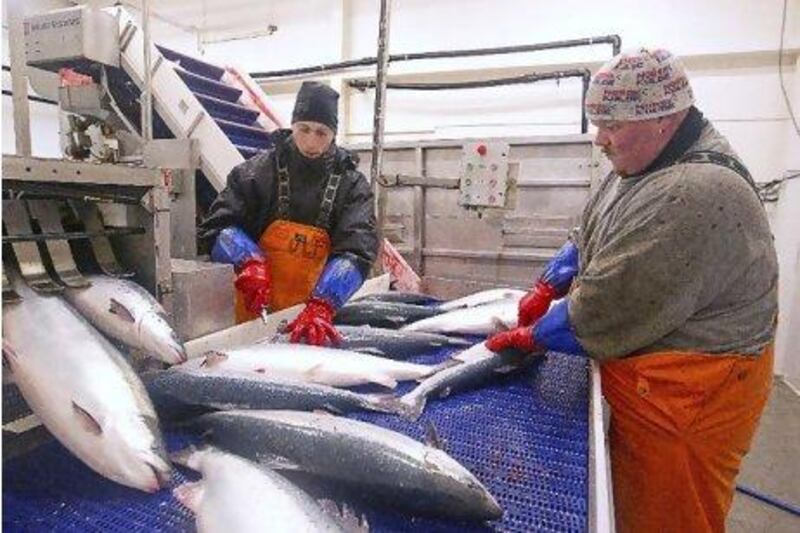BEIJING // Jackie Chan graces the front of the latest edition of the Norwegian Seafood Export Council's magazine, holding an impressive Norwegian salmon at a Beijing restaurant opening.
Since the row last year between Beijing and Oslo over the Nobel Peace Prize, exports to China have fallen off dramatically, and officials at the organisation perhaps hope the Hong Kong-born actor will spark extra interest among the Chinese in Norwegian salmon.
"It's really tough," said Henning Baltestad, the CEO of Lerøy Seafood Group, one of Norway's largest salmon-producing companies, which has been exporting "fresh Atlantic salmon" to China for about 15 years.
"We opened an office in Beijing and started to develop the market in China for salmon. Suddenly we're getting difficulties getting salmon into China."
It has been a year since China reacted furiously after the jailed democracy campaigner Liu Xiaobo was named the Nobel Peace Prize winner. The Communist Party launched a tirade against foreign "interference" in its affairs, and made clear relations with Norway, the country where the prize is based, would suffer.
Lerøy is not alone in having problems. Other Norwegian salmon producers have also seen exports to China plunge, and for Norway, which produces a third of the world's farmed salmon, this is a major concern.
In the first nine months of this year, Norwegian exports to China of fresh salmon fell to about 3,000 tonnes, from around 7,000 tonnes during the same period last year.
Christian Chramer, a spokesman for the Norwegian Seafood Export Council, in Tromso, northern Norway, said: "We expected an increase due to the trend over the past few years - we've seen an increase in consumption," said.
Exports to China have sunk even though China's newly wealthy middle-class are visiting upmarket sushi restaurants more often than ever before.
Producers say salmon from Norway, but not other countries, is subjected to stricter inspections by Chinese customs officials. In some cases, consignments have languished in storage, gone off and been thrown away.
As a result, producers, faced with 10-day delays in customs, are focusing on other markets, while exporters from other nations are filling the void.
Mr Baltestad said: "Normally it wouldn't take more than a day, but there's a risk it will take much more time if it's going to be analysed. It's not easy."
Other types of Sino-Norwegian commercial relations are apparently unaffected, with overall trade in both directions up by double-digit percentages this year.
Meanwhile, Mr Liu remains behind bars. The group Chinese Human Rights Defenders said yesterday that Mr Liu, jailed in 2009 for his part in the release of the pro-democracy manifesto Charter 08, "continues to languish in prison" a year on from when he was selected for the Nobel Peace Prize.
"CHRD calls on the Chinese government to immediately release Liu Xiaobo, end the house arrest of [Mr Liu's wife] Liu Xia, and cease the intimidation of Liu Xiaobo's family and supporters," the group said.
There are signs that the authorities are loosening the restrictions on the Liu family, with Mr Liu's brothers having recently visited him in jail, and last month Mr Liu was allowed out of prison briefly after his father died.
This could indicate a softening in the attitude of the Chinese authorities over the Nobel award that could also herald good news for Norwegian salmon exporters, said Chan Chepo, an assistant professor of political science at Lingnan University in Hong Kong.
Usually the Chinese authorities wait three to six months before they paper over diplomatic cracks created by disputes, he said, adding he was "surprised" Norwegian salmon exporters were still having problems.
"It seems [the Chinese authorities] are trying to start to minimise the significance of Liu Xiaobo's receipt of the Nobel Peace Prize," he said.
"So I assume they will also do that to Norway, so maybe sooner or later we'll hear something, [although] it's really difficult to make predictions."
The Norwegian government is considering a complaint to the World Trade Organisation. The Norwegian Seafood Export Council is not giving up on China.
"We expect China to grow and we would be more than happy to work again with full-scale operations in China," Mr Chramer said.






